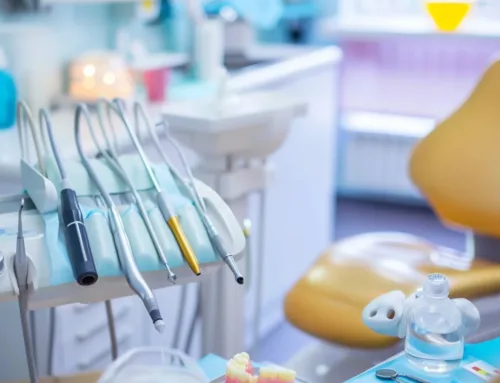Top 10 Dental Issues & How to Deal with Them
Suffering from a dental issue can disrupt anyone’s life. It can cause severe pain or prevent you from biting, chewing, speaking or swallowing—each an important daily function. The silver lining is that you are most likely experiencing a common ailment, which means there’s a proven treatment that will have you feeling better in no time.
Let’s review the top 10 dental issues, including but not limited to tooth decay, gum disease and a cracked tooth. Additionally, we’ll provide the most effective treatment methods.
if you are suffering from any of the issues covered in this article, we ask that you contact us to book a consultation because even if it is completely normal, waiting will only make it worse.
Tooth Decay
Tooth decay isn’t just one of the most common dental issues, it’s one of the most prevalent diseases in Canada. It is caused by bacterial action, or more specifically, when deposits of plaque combine with the sugar and starches we consume. Plaque is the main culprit, though, as it acts as an adhesive between acids and teeth, promoting the slow erosion of enamel.
A solution couldn’t be easier. Simply adopt better oral hygiene by brushing twice a day with a toothpaste approved by your dentist, flossing daily, eating nutritious food and visiting your dentist regularly.
When it’s too late, and you require a procedure to address tooth decay, Barrie Dentist provides all the standard go to treatments, such as dental fillings, tooth extractions, wisdom tooth removal, and root canals. To maintain full dental function, and to keep your smile looking it’s best, we also offer a variety of more advanced procedures including dental implants, crowns & bridges, dentures and much more.
Gum Disease
Gum disease, or periodontal disease, is categorized as when the tissue and bones that support your teeth become infected. The most common type is gingivitis, which can result in tooth loss.
With gum disease, you want to take a preventative approach by adhering to proper oral hygiene practices like brushing twice a day and flossing daily. Additionally, you should have your gums examined by your dentist often as an early diagnosis can make a big difference in a treatment outcome.
When gum disease has taken hold and caused gum recession, Barrie Dentist offers a special procedure called pinhole gum surgery to correct the recession of your gums.
Remember, gum disease is linked to non-dental health issues like heart attacks and strokes.
Cracked Teeth
Left untreated, a minor crack in your tooth can worsen into a full-blown cracked tooth. These are painful and can require extensive dental work to repair. You can crack a tooth by eating hard foods like ribs and other meat products with bones, chewing on objects with a tough exterior, sports related injuries, or from grinding your teeth in your sleep.
Treatments typically include dental bonding and porcelain veneers, to a patient needing 3D printed teeth, dental crowns, nightguards and other treatments depending on the severity of the damage involved.
Enamel Erosion
Each tooth is covered by a hard-mineral substance called enamel. It protects against tooth decay but can be weakened by the following:
- Consuming too much soda or fruit drinks.
- Having excessive dry mouth.
- Diets that are high in sugar and starches.
- Being prone to acid reflux.
- Gastrointestinal issues
- Wear and tear
You need to be cognizant of your enamel and do whatever you can to protected it, as once it’s gone, a dentist cannot replace it. We recommend only using toothpaste with fluoride and to make sure you brush and floss often.
While enamel can’t be replaced, we can help to repair it by using dental bonding and dental crowns (capping the tooth). The level of damage to the enamel is what will dictate what treatment method is ultimately used.
Tooth Sensitivity
Tooth sensitivity can drive a wedge into your life, transforming mundane activities like eating and drinking into uncomfortable experiences. Can you imagine feeling a sharp pain every time you bit into a sandwich?
Sensitivity is triggered by foods that are excessively sweet or extremely hot or cold. Cause for dental sensitivity can include tooth decay, weakened enamel or a cracked tooth. Due to the pain involved, you’ll likely want to visit us with even a slight sensitivity.
Treatments for dental sensitivity can include using specialized toothpastes designed for sensitive teeth that contains potassium nitrate, stannous fluoride, and strontium chloride, that plug the microscopic channels in your teeth, thus protecting the nerves from temperature changes, and food and drink.
For more severe cases, you may need to consider a dental crown or even implants. We’ll need to conduct a full examination in order to determine what the best treatment options are.
Toothaches
One of the most common dental afflictions are toothaches. Toothaches are a throbbing pain either in the tooth or the surrounding gum area. Side effects can include swelling in your gums, a fever, and headaches. Toothaches can be a result of an abscessed tooth, infected gums or a filling in need of repair. Once you start experiencing symptoms of a toothache, you have one option – visit us. Toothaches are almost always directly related to a bigger problem, which means it’s not going to go away until you deal with the underlying cause.
While you wait to see your dentist, here are some home remedies that are believed to numb or reduce pain associated with a toothache:
- Rinse with saltwater – using sea salt only.
- Rinse with a weak hydrogen peroxide mouthwash
- Cold compress on the jaw area
- Using warm peppermint tea bags
- Garlic paste with a touch of salt
- Tiny amount of vanilla extract
And a good over the counter medication to help numb the tooth and gum nerves is Orajel.
These remedies are only temporary and won’t work in every case. At best, they can help you feel better until your dentist can see you.
Overbites, Underbites and Crossbites
Jaw irregularities or misalignments that prevent the teeth from evenly meeting are divided into two categories: overbites and underbites. These misalignments can contribute to gum disease and can make speaking and eating painful and complicated.
Treatments depend on the severity of the issue and a course of action will be prepared by your dentist or orthodontist. One option will be braces, which will straighten your teeth into a final position over time. If you are given the diagnosis of needing braces, you’ll need to choose from metal or ceramic ones or clear aligners like Invisalign. Your orthodontist will present the suitable options after a full examination has been conducted.
Teeth Grinding
Teeth grinding is something that you might not even know you’re doing but is causing your teeth an enormous amount of stress. Often, there are invisible factors at play like anxiety, sleep disorders, stress, depression, allergies or a misalignment. People who grind their teeth could experience intense jaw pain, earaches or headaches.
Temporomandibular Disorder, or TMD is a condition that causes chronic facial pain, neck pain, and recurring headaches. In some cases, TMD can be caused by grinding your teeth.
Mild cases are normal and don’t require any treatment. Incidentally, if there is significant wear and tear on the top of your teeth you should immediately seek treatment.
Your dentist can fit you for a dental nightguard to prevent your teeth from grinding while you sleep and to alleviate any pain while reducing the odds of needing other treatments like dental bridges, implants or dentures down the road.
Jaw Pain
Jaw pain is a broad term so it can be hard to diagnose a cause. Dentists usually cite sinus issues, toothaches, arthritis, gingivitis, teeth grinding or the result of an injury as the more popular sources.
Temporomandibular joint disorder (TMD) is another source of jaw pain. The temporomandibular joint connects the jaw to the skull near each ear. It is the hinge that allows for smooth jaw movement and aids with chewing, talking and even yawning. Anything related to this joint can cause pain and falls under the umbrella of a TMD.
There is very little a person can do to treat their own jaw if a disorder is present. It requires a trip to the dentist, where they will perform a thorough exam, including X-rays, with the goal of devising a treatment plan.
Bad Breath
Chronic bad breath, or halitosis, can be a socially and professionally debilitating issue. Bad breath can be caused by a variety of things. Most are harmless, but in some cases, bad breath can be symptomatic of a bigger dental or general health problem.
Bad breath can be caused by diet, lack of oral hygiene, dry mouth, smoking, gum disease or medical conditions like gastric reflux, diabetes or kidney disease.
To combat bad breath, you must adopt a rigorous oral heath routine, including brushing twice a day using the proper technique and cleaning between your teeth with either dental or water floss. It is also recommended that you take care of your tongue. You should inspect your tongue daily by sticking it out and checking in a mirror for a white or brown coating at the back. You can clean your tongue with your toothbrush or a tongue scraper, which is less painful than it sounds.
Book Your Free Consult with Barrie Dentist Today!
At Barrie Dentist, we are well equipped to handle anything that is causing pain to your mouth. Our staff can determine your dental issues and find a solution that helps you achieve optimal oral health as quickly as possible.
Contact us today to book your free, no-obligation consultation.
Appointment Request
If you’re interested in any of our procedures, and would like to meet with one of our dentists to discuss options, costs and get additional information, complete this short form and we’ll give you a call to arrange for a no-obligation appointment at our Barrie clinic.










